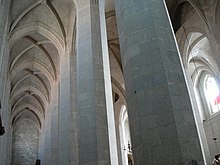- Our Lady, Aiguebelle
- Holy Saviour, Aix (cathedral)
- St Cecilia, Albi (cathedral)
- Our Lady, Alençon
- Our Lady, Amiens (cathedral)
- St Mary Magdalene, Angers
- Visitation, Annecy
- St Joseph, Annecy
- St Anne, Apt (cathedral)
- Our Lady, Arcachon
- St Dionysius, Argenteuil
- St Trophimus, Arles
- Our Lady and St Vedast, Arles (cathedral)
- St Sixtus, Ars
- St Mary, Auch (cathedral)
- St Lazarus, Autun (cathedral)
- Our Lady of the Doms, Avignon (cathedral)
- Our Lady, Avioth
- SS Gervasius and Protasius, Avranches
- Our Lady, Beaune
- St Christopher, Belfort (cathedral)
- Our Lady of Sewing, Bernay
- SS Ferreolus and Ferrutio, Besançon
- St John the Evangelist, Besançon (cathedral)
- Our Lady of the Trinity, Blois
- Our Lady, Bon-Encontre
- St Anne, Bonlieu-sur-Roubion
- Our Lady, Bonsecours
- St Michael, Bordeaux
- St Severinus, Bordeaux
- Our Lady, Boulogne
- Our Lady, Brebières
- St Julian, Brioude
- Our Lady, Buglose
- Our Lady of Grace and the Holy Sepulchre, Cambrai (cathedral)
- SS Nazarius and Celsus, Carcassonne
- St Maxellende, Caudry
- Our Lady, Ceignac
- St Francis de Sales, Chambéry (cathedral)
- Our Lady of Hope, Charleville-Mézières
- Our Lady, Chartres (cathedral)
- Our Lady of the Children, Châteauneuf-sur-Cher
- St John the Baptist, Chaumont
- Holy Trinity, Cherbourg
- Our Lady of the Port, Clermont Ferrand
- Our Lady, Cléry
- Holy Saviour, Dinan
- Our Lady, Dole
- St Joan of Arc, Domrémy-la-Pucelle
- Our Lady of Deliverance, Douvres
- St Maurice, Épinal
- Our Lady, Épine
- St Joseph of Good Hope, Espaly-Saint-Marcel
- Our Lady of the Thorn, Évron
- Our Lady the White, Faverney
- St Benedict, Fleury
- Immaculate Conception, Frigolet
- Sacred Heart, Grenoble
- St Joseph, Grenoble
- Our Lady of Good Help, Guingamp
- Our Lady of Paradise, Hennebont
- Sacred Heart, Issoudun
- Our Lady of the Bramble, Josselin
- Our Lady of Good Help, Lablachère
- Our Lady of Pity, La Chapelle-Saint-Laurent
- St John Francis Regis, Lalouvesc
- Our Lady, La Salette
- Our Lady of Sewing, Le Mans
- Our Lady, Le Puy (cathedral)
- Our Lady, Les Avénières
- Our Lady, Liesse
- Our Lady, Lille (cathedral)
- Our Lady of Marceille, Limoux
- St Thérèse, Lisieux
- Our Lady of Good Guard, Longpont-sur-Orge
- Our Lady of the Immaculate Conception, Lourdes
- Rosary, Lourdes
- St Pius X, Lourdes
- St Martin of the Sacred Heart, Lutterbach
- St Peter, Luxeuil-les-Bains
- Our Lady of Fourvière, Lyon
- St Martin of Ainay, Lyon
- Our Lady, Marienthal
- Our Lady of the Guard, Marseille
- Sacred Heart, Marseille
- St Mary Major, Marseille (cathedral)
- St Victor, Marseille
- St Peter Fourier, Mattaincourt
- Our Lady of Miracles, Mauriac
- Our Lady of Miracles, Mayenne
- St Stephen, Meaux (cathedral)
- Our Lady and St Privatus, Mende (cathedral)
- St Michael the Archangel, Menton
- St Vincent, Metz
- Our Lady, Montligeon
- Our Lady of the Tables, Montpellier
- SS Peter and Paul, Montpellier (cathedral)
- Our Lady, Moulins (cathedral)
- Our Lady, Mont Sainte-Odile
- Our Lady of Lourdes, Nancy
- Sacred Heart, Nancy
- St Aprus, Nancy
- SS Donatian and Rogatian, Nantes
- St Nicholas, Nantes
- SS Justus and Pastor, Narbonne (cathedral)
- St Paul, Narbonne
- St James, Neuvy-Saint-Sépulchre
- SS Cyricus and Julitta, Nevers (cathedral)
- Our Lady of the Assumption, Nice
- SS Mary and Reparata, Nice (cathedral)
- Our Lady and St Castor, Nîmes (cathedral)
- Our Lady of the Irons, Orcival
- Holy Cross, Orléans (cathedral)
- Sacred Heart, Paray-le-Monial
- Our Lady, Paris (cathedral)
- Sacred Heart, Paris
- Our Lady of Perpetual Help, Paris
- Our Lady of Victories, Paris
- SS Clotilde and Valerius, Paris
- St Front, Périgueux (cathedral)
- St John the Baptist, Perpignan (cathedral)
- St Peter, Poitiers (cathedral)
- Our Lady of Joy, Pontivy
- St Corentinus, Quimper (cathedral)
- Our Lady of Deliverance, Quintin
- St Clotilde, Reims
- St Remigius, Reims
- Our Lady of Miracles and Virtues, Rennes
- St Albinus and Our Lady of Good News, Rennes
- St Amabilis, Ricomage
- Our Lady, Rocamadour
- Our Lady, Rodez (cathedral)
- Sacred Heart, Rouen
- St Anne, Sainte-Anne-d'Auray
- Our Lady of Good Help, Saint-Avold
- Our Lady of Hope, Saint-Brieuc
- St Stephen, Saint-Brieuc (cathedral)
- St Peter, Saint-Claude (cathedral)
- St Eutropius, Saintes
- St Peter, Saintes (cathedral)
- Our Lady of Laus, Saint-Étienne-le-Laus
- St Louis de Montfort, Saint-Laurent-sur-Sèvre
- St Nicholas, Saint-Nicolas-de-Port
- Our Lady of Miracles, Saint-Omer (cathedral)
- St Paul Aurelian, Saint-Pol-de-Léon (former cathedral)
- St Quentin, Saint-Quentin
- Our Lady of Victory, Saint-Raphaël
- St Andochius, Saulieu
- Our Lady, Sées (cathedral)
- Our Lady of the Immaculate Conception, Sées
- Our Lady, Sion
- SS Gervasius and Protasius, Soissons
- Our Lady of the Oak, Solesmes
- Our Lady, Thierenbach
- St Francis de Sales, Thonon-les-Bains
- Our Lady of the Daurade, Toulouse
- St Saturninus, Toulouse
- St Martin, Tours
- St Tudwal, Tréguier (cathedral)
- St Urban, Troyes
- St Apollinaris, Valence (cathedral)
- Our Lady of the Holy Girdle, Valenciennes
- St Peter, Vannes (cathedral)
- Our Lady, Verdelais
- Our Lady, Verdun (cathedral)
- St Mary Magdalene, Vézelay
| |



